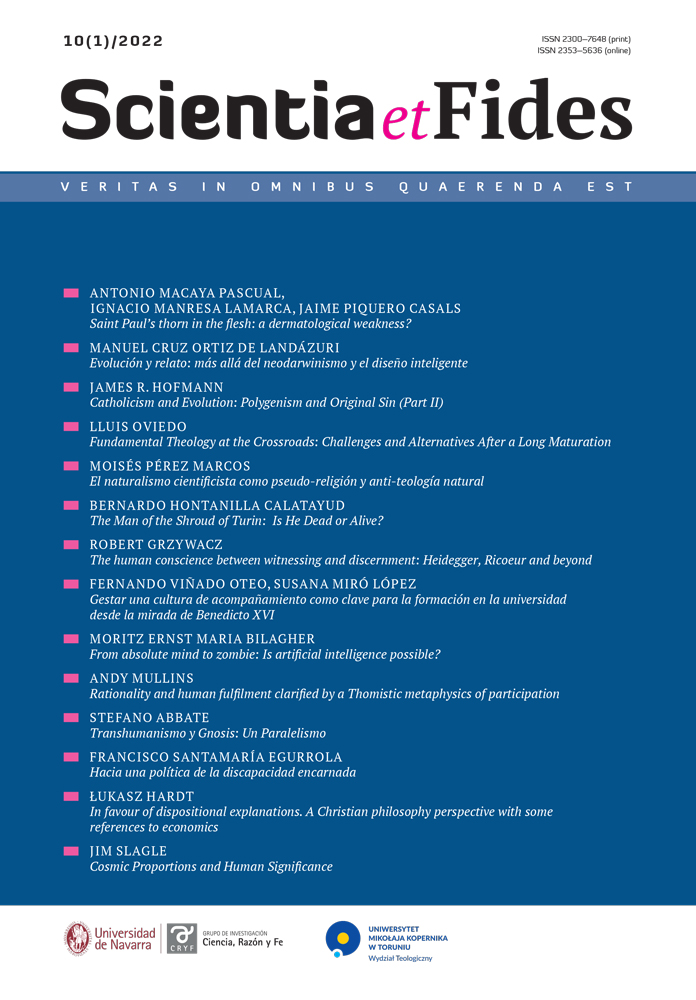Fundamental Theology at the Crossroads: Challenges and Alternatives After a Long Maturation
DOI:
https://doi.org/10.12775/SetF.2022.003Keywords
Apologetics, Revelation, Faith, Credibility, Secularization, ScienceAbstract
Fundamental Theology (FT) has undergone a slow evolution, as many other theological disciplines, since its inception in the aftermath of the Second Vatican Council. The lapsed time invites us to reflect about the current situation in this field and to what extent that theological section is pursuing its main objectives, especially for its teaching at different levels. After examining several issues that could have influenced that development, some suggestions for advancing the field and its teaching will also be given. Indeed, both the internal and external contexts have changed quite a lot in the last 60 years, and this probably will influence a treaty that should be more contextually sensitive and very bound to developments in religious education.
References
Aguirre, Anthony, Brendan Foster, Zeeya Merali (Eds.). 2019. What is Fundamental? Cham, Switzerland: Springer.
Angel, Hans-Ferdinand. Ll. Oviedo, R.F. Paloutzian, A, Runehov, R.J. Seitz (Eds.). 2017. Processes of Believing: The Acquisition, Maintenance, and Change in Creditions. Dordrecht: Springer.
Barton, John. 2019. A History of the Bible: The Book and Its Faiths. London: Allen Lane.
Benedict XVI, 2019: https://www.catholicnewsagency.com/news/full-text-of-benedict-xvi-the-church-and-the-scandal-of-sexual-abuse-59639
Bevans, Stephen B. 1992. Models of Contextual Theology. Maryknoll - New York: Orbis.
Castillo, Ramon D., H. Kloos, M. J. Richardson, & T. Waltzer. 2015. Beliefs as Self-Sustaining Networks: Drawing Parallels between Networks of Ecosystems and Adults’ Predictions. Frontiers in Psychology 6, 1723. doi: 10.3389/fpsyg.2015.01723.
Connors, Michael H. and Peter W. Halligan. 2015. “A cognitive account of belief: a tentative roadmap”. Frontiers in Psychology 5, Article 1588.doi: 10.3389/fpsyg.2014.01588.
De Cruz, Helen and Johan de Smedt. 2014. A Natural History of Natural Theology: The Cognitive Science of Theology and Philosophy of Religion. Cambridge, Ma: MIT Press.
Frei, Hans W. 1992. Types of Christian Theology. Yale: Yale University Press.
Jones, James. 2016. Can Science Explain Religion? The Cognitive Science Debate. Oxford: Oxford University Press.
Lindbeck, George A. 1984. The Nature of Doctrine: Religion and Theology in a Postliberal Age. Louisville, MO, London: Westminster John Knox.
Niebuhr, Richard. 1951. Christ and Culture. New York: Harper & Row.
Pié i Ninot, Salvador. 2017. Teología Fundamental. Madrid: BAC.
Seitz, Ruediger J. & Hans-Ferdinand Angel. 2014. “Psychology of religion and spirituality: Meaning-making and processes of believing”. Religion, Brain & Behavior 5 (2), 139-147.
Smith, Aaron C. T. Thinking about Religion: Extending the Cognitive Sciences of Religion. 2014. Basingstoke, UK, New York: Palgrave MacMillan.
Downloads
Published
How to Cite
Issue
Section
License
Copyright (c) 2022 Scientia et Fides

This work is licensed under a Creative Commons Attribution-NoDerivatives 4.0 International License.
CC BY ND 4.0. The Creator/Contributor is the Licensor, who grants the Licensee a non-exclusive license to use the Work on the fields indicated in the License Agreement.
- The Licensor grants the Licensee a non-exclusive license to use the Work/related rights item specified in § 1 within the following fields: a) recording of Work/related rights item; b) reproduction (multiplication) of Work/related rights item in print and digital technology (e-book, audiobook); c) placing the copies of the multiplied Work/related rights item on the market; d) entering the Work/related rights item to computer memory; e) distribution of the work in electronic version in the open access form on the basis of Creative Commons license (CC BY-ND 3.0) via the digital platform of the Nicolaus Copernicus University Press and file repository of the Nicolaus Copernicus University.
- Usage of the recorded Work by the Licensee within the above fields is not restricted by time, numbers or territory.
- The Licensor grants the license for the Work/related rights item to the Licensee free of charge and for an unspecified period of time.
FULL TEXT License Agreement
Stats
Number of views and downloads: 1976
Number of citations: 0



